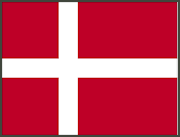Danish Military Culture
 Danish culture has been described by sociologists and writers in both negative and positive ways. However, at the intersection between all these different generalisations lies a culture derived partly from a peasant and sailing culture led by a small elite and partly from living through an, in a Danish perspective, traumatic national history, where the country has been reduced territorially from the status of a North Sea empire during consecutive wars since the 16th century.
Danish culture has been described by sociologists and writers in both negative and positive ways. However, at the intersection between all these different generalisations lies a culture derived partly from a peasant and sailing culture led by a small elite and partly from living through an, in a Danish perspective, traumatic national history, where the country has been reduced territorially from the status of a North Sea empire during consecutive wars since the 16th century.
Shaped by defeats in wars in the 19th century, during the 20th and 21st centuries the focus has been on creating a large welfare state. Danes are characterised today by constituting a widely ethnically and economically homogenous group that does not emphasise status and social hierarchy and, in some ways, perceives the display of status and wealth negatively.
After Denmark’s last big defeat in war at the hands of Bismarck’s Prussia in 1864 over a border conflict regarding Schleswig-Holstein, the Danish author H. P. Holst declared that ‘what is outwardly lost must be inwardly won’. Since then, the Danes have developed a culture characterised by a high degree of informality and social flexibility. One of the most prominent characteristics of this culture is the ‘consensus culture’, which affects all parts of Danish society. Also, Denmark’s foreign policy has since the turn of the millennium developed into a more activist one, where the majority of the population consistently has supported the deployment of Danish soldiers in Iraq, Afghanistan and many other, smaller missions.
The Danish military is separated into three Services, Navy, Air Force and Army, which are all under the command of a central command, which again answers directly to the Ministry of Defence. In addition to these Services, the Danish military consists of the National Guard, consisting of reserve and part-time volunteers, the Special Operation Command.
The Danish army does not have one single culture, social or professional. Over the last 20 years the regimental structure has been reduced and the units have been merged into battalion-sized task forces. This means that there has been little time to cultivate the traditional regimental structures. The regimental structure still exists, but there are few regiments left, and they no longer have an operational function. This has instead become the responsibility of the Danish Division and two brigades in Denmark, who are fitted with units according to the task at hand, while the regiments exist primarily as a ceremonial container.
A common set of values can be identified in the Danish military, and they are primarily created through the officers academies and NCO school structure. One major Danish characteristic is the perspective of efficient time management. The postponement of meetings or delaying of dinner times is almost taboo in Danish military culture. The Danes value, in their own perception, a very efficient use of the hours worked, especially in the military, and the set number of demanded hours worked is regulated and union-negotiated.
Combined with Danish society’s ‘Jante Law’, low power distance and the Danish military’s strong task-focussed and goal-oriented professional culture, the Danish private, NCO and officer look unfavourably at colleagues, Danish or international, who postpone or hold ineffective meetings, intrude in settled leisure time due to bad planning etc., as the very strict Danish perspective on time is highly ingrained and in civilian life perhaps even considered a civil right.
Despite the above, an interesting paradox exists in Danish military culture. In peacetime or non-conflict settings the culture is affected by the general, civilian social culture. The two major potentials for miscommunication, the Danish culture of open discussion and the ‘Jante Law’, are also relevant in the military context, especially concerning Danes’ perception of leaders and subordinates who do not own up to their mistakes.
However, at the same time, Danes consider themselves defined by their military professionalism. This interesting paradox is a result of the same practical and taskfocussed goal orientation of Danish culture, especially prevalent in the military; once a decision has been made, and an operation or assault has been initiated, the Danish ‘battle mind’ at all levels – staff, NCO and private – is characterised by little hesitation and great determination. In other words, the consideration for the collective effort then overtakes the individualistic culture and possible individual criticisms and biases.
One great, if not the main, potential for miscommunication with Danes resides in the clash between the Danish culture for open discussion and the leadership principles and, in a Danish perspective, traditions of other countries. An authoritarian leader who demands professionalism and the exertion of energy based on his or her formal status (e.g. by pulling rank) can hit directly into a Danish culture of frank, open discussion about mistakes and alternatives to a given course of action.
|
NEWSLETTER
|
| Join the GlobalSecurity.org mailing list |
|
|
|

